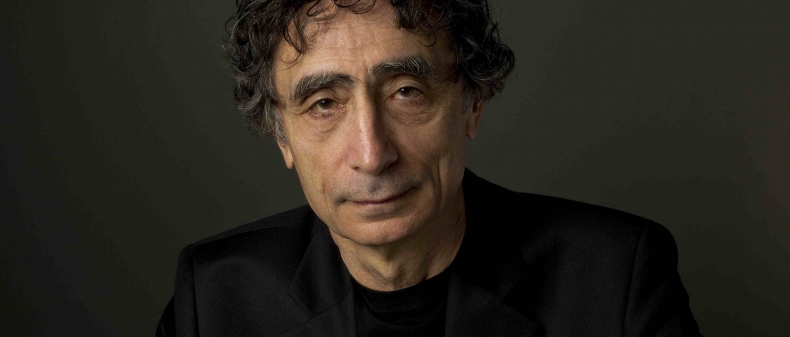
Gabor Maté, M.D.
Gabor Maté has dedicated much of his life to understanding the nature of addiction. The Hungarian-born Canadian physician and best-selling author worked for decades on Vancouver’s downtown eastside, providing compassionate care for people that society would rather discard. The Nazi genocide survivor maintains that early childhood trauma can shape our propensity to addiction. His latest work is interested in examining societal factors that contribute to a climate of toxicity, a culture that is inherently disconnected and vacuous. He aims to shine a light on these dark corners of human experience so that we can start to challenge our assumptions about how society can be, and how we ourselves can change our minds.
What is behind your latest focus – Toxic Culture: How Materialistic Society Makes us Ill?
All my work has been around understanding why human dysfunction happens. Not looking at causes – not at people’s pre-dispositions or genetic inheritance – but what actually happens in people’s lives. We know now that the determinants of health – whether we’re talking physical health, emotional — has a lot to do with people’s life experiences. So I’ve been exploring that a lot in all four of my books.
But people’s lives don’t happen in a vacuum. It occurs in the context of society. What makes people healthy or sick has a lot to do with the kind of lives they lead. And those lives are played out in the context of a society and a culture. The way that society is organized, its values, the pressures it generates on people, the expectations, how people treat each other, how they’re educated, what their values are — these all have a huge impact on people’s health.
If it was discovered that there was some toxin, some chemical in the Toronto water system, that caused illness -everybody would naturally want to see it removed. I’m saying that there are many things about our culture — from the way we live and how society is run – that actually contribute to people being sick.
How do you think this has affected older people in our society?
People have a need for meaning and for belonging. But this society defines the value of a human being by how much they can either produce or consume. For all our talk about human values, we don’t really value humans for who they are. We value them for what they either give or purchase.
In other cultures, elders are considered to be people with wisdom, with experience, with a contribution to make. In our society, we don’t talk about elders, we talk about ‘the elderly’ — in other words, we define them by their age. And once they’re no longer either producers or consumers, they lose their value. We know that the more isolated people are, the more likely they are to get sick and the more likely they are to die of their illness. This is a society that isolates people.
Is there a way to be “in this world, but not of it,” so to speak?
The only way to live healthy in this culture is to be in it but not of it. And that means being able to see through a value structure that has materialism as its highest goal. By materialism, I mean that the control and possession of material goods are seen as the greatest obsessions. And the people that are seen as the highest achievers are the ones who acquire and wield more material control than other people do. To buy into that is to limit our human capacity, and therefore, to limit human health.
How can a person break through that?
Does the person see the connection between their lack of joy or their depression or their mental illness or their alienation from work or life or nature — do they see it as a problem? If they don’t see it as a problem, then there’s no point of giving any type of advice.
More people are questioning; are we heading in the right direction? Do we hold the right set of values? Is it serving our physical and mental health? Is it serving our spiritual health? And by the way, that’s one of the failures of the medical system – is that it considers people only in physical terms. The fact that people have emotional needs is kind of recognized but the relationship of that to illness is not recognized. And the fact that we have spiritual needs? We don’t even talk about that.
Why do you think that is?
Because the essence of capitalism is to reduce things to commodities. Or to reduce people to things that consume commodities. Everything else is secondary. So we have a lot of religion but very little spirituality.
Has there ever been a culture that has been balanced, in your opinion?
There’s no point hearkening back to the past, because we can’t return to it. If I look at cultures that are still connected to the land and connected to nature, these are so-called ‘primitive’ cultures. But they’re only ‘primitive’ only in the sense that they’re ‘prime’ (they’re first). Those are very balanced cultures, for the most part. But you can’t hold that up as an ideal because they were historical phenomena that are gone. They’re gone because they couldn’t be sustained in the face of evolution and forces of historical necessity.
It’s not a question of saying ‘can we go back to something’ – because we can’t. But we can certainly understand what was right about them, and we can consciously adopt some of that. And we can consciously make it a value. Is it necessary to destroy nature in order to have wealth? Do people have to live in competition with each other, seeing each other as enemies, as dog-eat-dog, a world where the so-called “fittest” survive? Is it possible to envision a world where people actually cooperate and it’s not winner takes all?
How has this culture of materialism affected you personally?
To the extent that I’ve bought into it, and in some ways of course I have. When I spend my life trying to prove my value by being important, or being needed by other people, to the degree where I ignore my own needs, and I ignore the needs of my own family. That has consequences.
What is your position now in terms of Ayahuasca treatments to treat addiction?
I’ve just come back from Mexico where I led a week-long retreat with ayahuasca. It’s not legal in Canada. I’m not going to fight Health Canada over it. There are various modalities of healing that are outside the Western medical canon which are very effective. Ayahuasca is a particularly helpful and useful and absolutely harmless modality. There were 27 participants in our retreat — (including from Toronto) – there were 27 miracles. There’s a woman in Toronto who is no longer using drugs at all — this is after 25 years of heavy opiate use — she’s no longer having to use any medicines, any pharmaceuticals at all, because of her work with plant medicine. I don’t care what Health Canada says. I know what the possibilities are. Now, they set the rules, and I have to play by the rules.
Why do you think Health Canada wants to keep this out of the hands of Canadians?
There have been all kinds of damaging ways that people have used psychedelic substances. We have to accept that. That’s a reality. Therefore there’s a fear of even discussing anything that people think of as psychedelics. Whereas, psychedelic just means ‘mind manifesting,’ it’s a reveal of changed mind, that’s all that it means.
In Canada, tens of thousands of kids are getting all kinds of medications for mental health conditions. At Vancouver Children’s Hospital, they had to establish a clinic to deal with the side effects of the anti-psychotics. It’s that serious. These anti-psychotics have never been studied in kids. The long-term effects on the developing brain of the child has not been defined. We already know that there are significant and even health-threatening side effects. That doesn’t stop them from being legal. The system allows for these substances- that we know are potentially quite harmful – to be given to kids. The system does not allow for substances that are known to be harmless — and which they themselves have acknowledged to be harmless — to be tried in a therapeutic context. It makes no sense. I don’t think it’s a plot or ill will. It’s a narrowness of a mindset.
Are there other ways of re-wiring the brain to curb addictive urges and re-evaluate trauma?
Ayahuasca is a small part of what I do. It’s a capacity in the brain to develop circuits later on in life, and to re-wire the old circuitry. There’s a number of ways to achieve that, all of which involve dealing with the past, dealing with the impact of the past programming and having new experiences of one’s self. That can be done through meditation, it can be done through compassionate therapy, it can be done through plant medication (in the right context).
Do we recognize the capacity of the human being for new development? Do we get excited about the possibility of re-wiring deeply engrained patterns? And how can we promote that in children and adults? That raises a whole exciting question, in terms of the what the potential is with human beings. And again it comes back to, what kind of conditions do we provide for people? And that comes back to the culture.
You wrote of addictions and how it was “where we constantly seek something outside ourselves to curb an insatiable yearning for relief or fulfilment. The aching emptiness is perpetual…” Can we ever achieve completion within ourselves? How?
Yes. The ‘how’ has to do with the individual past that we each have to forge for ourselves. But what I do know about human beings is that we were born full and complete. That fullness and completion is not something we have achieve, it’s not something we have to realize. That’s our nature. The emptiness is not our nature. The emptiness is a response to our circumstances. We develop the emptiness when we lose contact with ourselves. And that happens when the environment can’t see us, support us, accept us, celebrate us, value us – for who we are as children.
But that fullness — we don’t have to create it its already there. People get there through spiritual paths, some people get there through plant medicine, and what they experience with that. I know that I’m far more appreciative of that potential for fulfillment internally than I used to be in my life. I used to think it was all outside of me. I thought I had to get it through this activity or that activity or this attainment — or whatever. It’s no longer how I see it at all.
What can a person do to make themselves healthy?
People can begin by just investigating what is out there in the writings of others. It has to begin somewhere. I know what people get from my books is liberation from shame. And that they realize that wherever they’re at, is not their fault. It’s not some of a fatal flaw that they’re stuck with. It does have to do with what has happened in life. And that what has happened in life doesn’t define them. So they can get beyond their history and their circumstances. What isn’t working — is not who they are. And they don’t have to be limited by it.
What’s the biggest challenge at this point in your life?
It’s to embody in my life whatever insights and wisdom I’ve been able to acquire. It’s to actually embody it. To actually live a life that’s consistent with what I know. I’m 69, so I’m at the stage that if not now, when?
What brings you the greatest joy?
You know not too long ago, I would have said ‘nothing.’ Just because I’ve been a depressive for most of my life in terms of my own mood states. My answer now is just that: joy doesn’t have to be brought to anybody. It’s part of who we are. Secondly, what brings the greatest joy is when I see human potential being realized. When I see transformation, when I see personal liberation, when I see liberation on any level —whether it is political or personal. Where I see love. This is what triggers joy in me.
Gabor Maté’s upcoming speaking engagements in Toronto next week are listed here.
____
Tiffy Thompson is a writer and illustrator for the Toronto Standard. Follow her on Twitter at @tiffyjthompson.
For more, follow us on Twitter at @TorontoStandard and subscribe to our newsletter.














